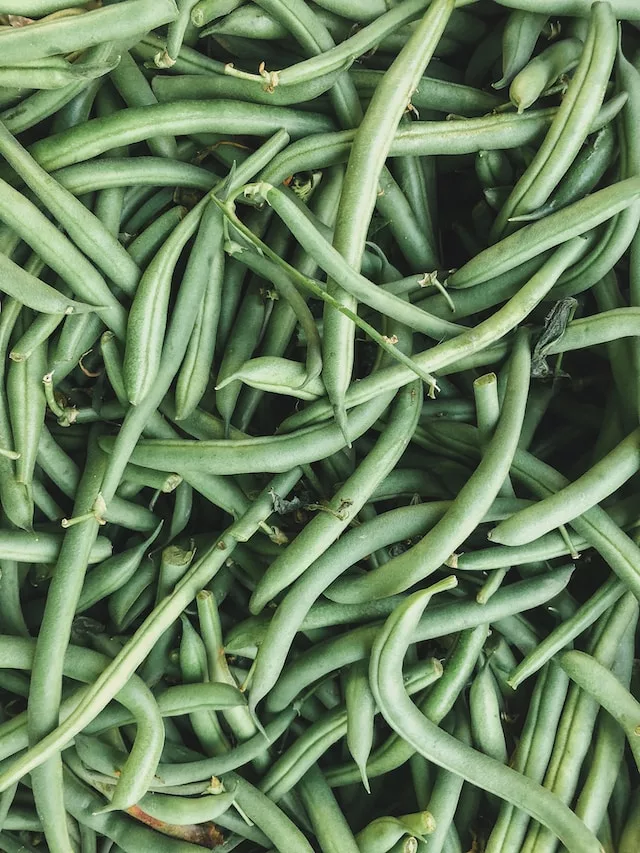The heart, an organ that tirelessly pumps life-sustaining blood throughout our bodies, is undoubtedly one of the most vital components of our anatomy.
Maintaining its health is paramount, and incorporating heart-friendly foods into your diet is an excellent way.
One such heart-boosting superfood is the humble green beans. These slender, green pods are not just a delightful addition to your plate but also offer a myriad of benefits for cardiovascular health. It has high fiber and antioxidant power.
In this blog post, we will explore how green beans support heart health and why you should consider making them a regular part of your diet.
Table of Contents
Benefits of Green Beans to Heart’s Health

1. High Fiber Content
Green beans are a fantastic source of dietary fiber. Fiber plays a critical role in heart health by helping to regulate cholesterol levels.
The soluble fiber in green beans binds to cholesterol and ushers it out of your body, preventing it from building up in your arteries.
By reducing cholesterol levels, green beans decrease the risk of heart disease, including atherosclerosis, a condition characterized by the hardening and narrowing of arteries due to cholesterol plaque buildup.
2. Antioxidant Power
Green beans also pack a powerful antioxidant punch. Antioxidants are compounds that combat oxidative stress, which is a significant contributor to cardiovascular issues.
Oxidative stress occurs when there is an imbalance between harmful free radicals and antioxidants in your body.
This imbalance can damage cells, proteins, and DNA, increasing the risk of heart disease.
The antioxidants in green beans, including vitamins C and A, can help neutralize free radicals, protecting your heart from oxidative damage.
This antioxidant shield not only supports overall heart health but may also reduce the risk of heart-related conditions, such as heart attacks and strokes.
3. Low Sodium, High Potassium
An essential component of heart health is maintaining healthy blood pressure levels. Green beans naturally support this aspect of cardiovascular well-being due to their low sodium content and high potassium levels.
Excessive sodium intake can lead to high blood pressure, a risk factor for heart disease. Green beans, on the other hand, are a low-sodium food, making them an excellent choice for those looking to reduce their sodium intake.
Moreover, the potassium in green beans helps balance sodium levels in your body, promoting healthy blood pressure. This mineral helps relax blood vessels, reducing strain on the cardiovascular system and lowering the risk of hypertension.

How to Add Green Beans to Your Diet
Now that you know the heart-healthy benefits of green beans, you might be wondering how to make them a regular part of your diet.
So here are a few delicious and nutritious ways to enjoy green beans:
- Steam or blanch green beans for a simple and nutritious side dish. A touch of olive oil and your favorite herbs can add flavor without compromising their heart-healthy benefits.
- Incorporate green beans into stir-fries for a crunchy, nutrient-packed addition to your meals.
- Add green beans to soups and stews to boost the fiber content and enhance their heart-protective qualities.
- Prepare a fresh and vibrant green bean salad with cherry tomatoes, feta cheese, and a zesty vinaigrette.
The Bottom Line
Green beans, often overlooked in the realm of superfoods, offer an impressive array of heart-boosting benefits.
Their high fiber content regulates cholesterol levels, their antioxidants combat oxidative stress, and their low sodium, high potassium combination supports healthy blood pressure.
By incorporating green beans into your diet, you can take a significant step towards protecting your heart and ensuring it remains in tip-top shape for years to come.
So, why not make green beans a regular guest at your dining table and let them become a part of your heart-healthy journey? Your heart will thank you for it!
Frequently Asked Questions About How Green Beans Support Heart Health
How do green beans contribute to heart health?
Green beans are rich in fiber, which helps lower cholesterol levels and maintain a healthy cardiovascular system.
The soluble fiber in green beans binds to cholesterol in the body, preventing its absorption and aiding in its excretion.
This can ultimately reduce the risk of heart disease and related issues.
What specific nutrients in green beans promote heart health?
Green beans are packed with essential nutrients like potassium, folate, and antioxidants. Potassium helps regulate blood pressure, reducing the strain on the heart.
Folate plays a crucial role in reducing homocysteine levels, which, when elevated, can increase the risk of cardiovascular disease.
Additionally, antioxidants like flavonoids in green beans contribute to overall heart health by combating oxidative stress and inflammation.
How can incorporating green beans into a heart-healthy diet benefit individuals with cardiovascular concerns?
Including green beans in a heart-healthy diet provides a low-calorie, nutrient-dense option that supports overall cardiovascular well-being.
The fiber content aids in weight management by promoting satiety and regulating blood sugar levels.
Moreover, the various nutrients in green beans work synergistically to enhance heart health, making them a valuable addition to a balanced and heart-friendly eating plan.
Disclaimer: The following information is provided solely for informational purposes and should not be considered professional advice or a substitute for professional consultation. While every effort has been made to ensure the accuracy and reliability of the information presented, we make no representations or warranties of any kind, express or implied, regarding the completeness, accuracy, reliability, suitability, or availability of the information provided. Any reliance you place on such details is strictly at your own risk.








